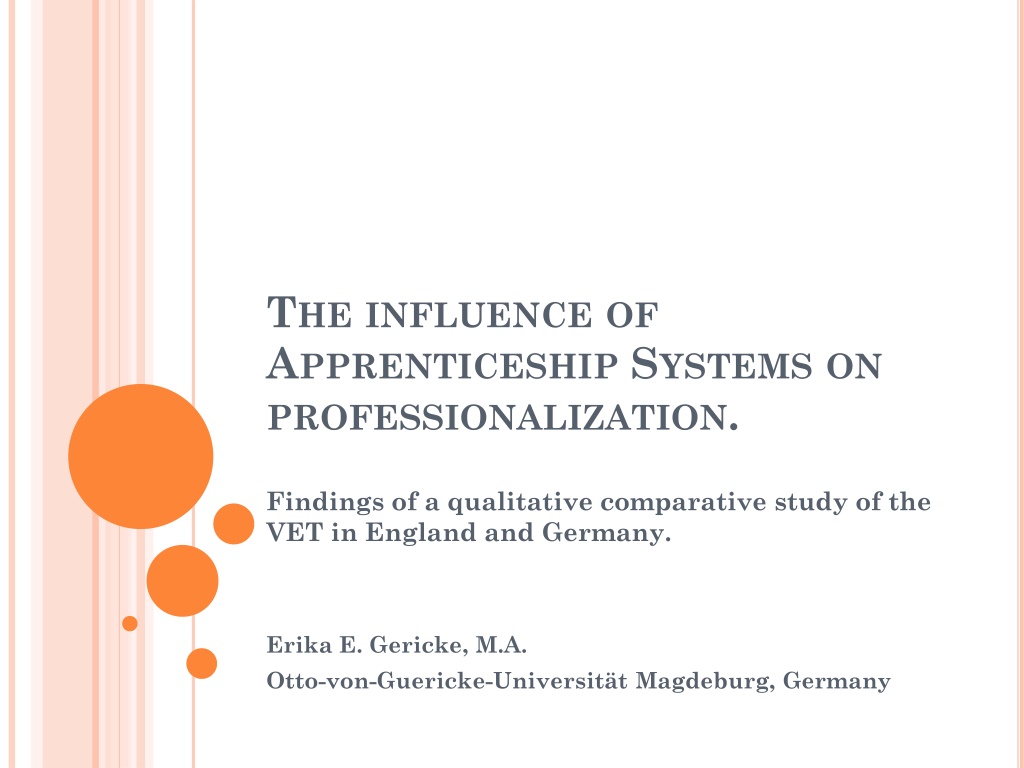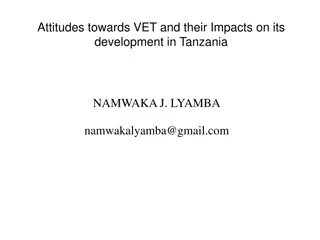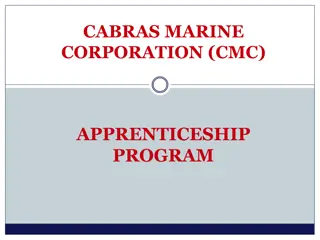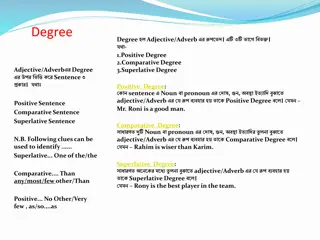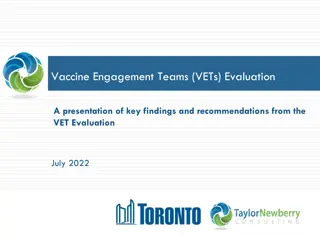Comparative Study of Apprenticeship Systems in VET: England vs Germany
Qualitative comparative study by Erika E. Gericke explores the influence of apprenticeship systems on professionalization in Vocational Education and Training (VET) in England and Germany. Findings delve into biographical orientations towards occupation, the role of VET systems, changes in the working world affecting European VET policies, research questions, methodology, and key patterns identified. The study focuses on car mechatronics within the automobile industry.
Download Presentation

Please find below an Image/Link to download the presentation.
The content on the website is provided AS IS for your information and personal use only. It may not be sold, licensed, or shared on other websites without obtaining consent from the author. Download presentation by click this link. If you encounter any issues during the download, it is possible that the publisher has removed the file from their server.
E N D
Presentation Transcript
THE INFLUENCE OF APPRENTICESHIP SYSTEMS ON PROFESSIONALIZATION. Findings of a qualitative comparative study of the VET in England and Germany. Erika E. Gericke, M.A. Otto-von-Guericke-Universit t Magdeburg, Germany
CONTENT Changes of the Working World and its Effects on European VET Systems 1. Research Questions 2. Methodology and Qualitative Research Design 3. Findings 1. Three Patterns of biographical orientations towards occupation 2. The Role of the English and German VET System 4. 2 Conclusion and Discussion 5.
1. CHANGES OF THE WORKING WORLD AND ITS EFFECTS ON EUROPEAN VET POLICY Macro-societal change: Increased individualization Increased globalisation European VET policy: Bruge/Copenhagen process In Germany discussion and reform of the occupation principle (Berufsprinzip) 3
2. RESEARCH QUESTIONS Which biographical orientations towards occupation do English and German car mechatronics develop? How do a fragmented (i.e. England) VET system and a holistic (i.e. Germany) VET system influence the development of the biographical orientations towards occupation ? Term biographical orientations towards occupation A concept which captures the process character A concept which links both levels: structure and action 4
3. METHODOLOGY AND QUALITATIVE RESEARCH DESIGN (I) Grounded Theory methodology (cf. Strauss/ Corbin 1990) Survey instrument: autobiographic-narrative interview (cf. Sch tze 1981, 1983) Analysis instruments: Narrative analyses (cf. Sch tze 1983) for 1stquestion Grounded theory (cf. Strauss/ Corbin 1990) for 2nd research question 5
3. METHODOLOGY AND QUALITATIVE RESEARCH DESIGN (II) Sample in general: Automobile industry Car mechatronic Sample in specific: Informant have been working in their occupation for at least 3 years German informants have completed their apprenticeship successfully Informants aged between 30 and 67 years old 6
4. FINDINGS 4.1 THREE PATTERNS Question: Which biographical orientations towards occupation do English and German car mechatronics develop? Reconstruction of three patterns of biographical orientations towards occupation, valid for both English and German car mechatronics: strategic use of VET institutions drawing border regarding the work field passionate handling 7
4. FINDINGS 4.2 INFLUENCE OF THE NATIONAL VET SYSTEM (I) Question: How do a fragmented (i.e. England) VET system and a holistic (i.e. Germany) VET system influence the development of the biographical orientations towards occupation? Reconstruction of the subjective perception of the VET system having certain institutional conditions have to exist in order to choose the right occupation thus completing the apprenticeship successfully & having a smooth transition to the labour market. 8
4. FINDINGS 4.2 INFLUENCE OF THE NATIONAL VET SYSTEM (II) These institutional conditions which are given in the German but surprisingly not in the English context are: family addressing/ discussing the issue of choosing an occupation school curriculum which includes the issue of vocational training by providing information about occupations or organizing a trip to the information centre and by providing the opportunity to get to know occupations hands- on via work-placements up-to-date teachers, trainers and college equipment as well as a balanced theoretical and practical input. 9
4. FINDINGS 4.2 INFLUENCE OF THE NATIONAL VET SYSTEM (III) Transition school-VET Direct entry & family-related gatekeeper Period of unemployment & choosing occupation arbitrarily Subjective Perception of the VET Dual System, good Different types of VET, improvable Subjective Perception of the national technical culture Automobile as a quasi-organism; workshop industry: all-rounder Automobile as a quasi-organism; workshop industry: single units 10
5. CONCLUSION AND DISCUSSION English and German car mechatronics follow one of the three reconstructed patterns of biographical orientations towards occupation In spite of the different national institutional conditions. The difference is that it takes the English car mechatronics longer and with personal costs to arrive at one of the three patterns. The VET system influences the development process of biographical orientations toward occupation. However, the concern of some German scientists that replacing broad vocational qualifications with partial qualifications will hinder the development of a holistic occupational self-conception has been refuted with this study. 11
REFERENCES Beck, U. 2003, Risikogesellschaft. Auf dem Weg in eine andere Moderne. Sonderausgabe zum 40j hrigen Bestehen der edition Suhrkamp 2003. Frankfurt am Main: Suhrkamp. Drexel, I. 2011, Berufsprinzip oder Modulprinzip? Zur k nftigen Struktur beruflicher Bildung in Deutschland. In: Verband der Lehrerinnen und Lehrer an Berufskollegs NW (Hg.), Berufskollegs st rken hei t die berufliche Bildung zu st rken. Online verf gbar unter http://www.anti- bertelsmann.de/berufsbildung/20082009/Berufsprinzip%20oder%20Modulprinz ip%20-%20Aufsatz%20VLBS.pdf, accessed on 15.08.2011. Giegel, H.-J., Frank, G., Billerbeck, U. 1988, Industriearbeit und Selbstbehauptung. Berufsbiograph. Orientierung u. Gesundheitsverhalten in gef hrdeten Lebensverh ltnissen. Opladen: Leske + Budrich. Kuda, E., Strau , J. 2006, Europ ischer Qualifikationsrahmen - Chancen oder Risiken f r Arbeitehmer und ihre berufliche Bildung in Deutschland? In: WSI Mitteilungen 2006, Volume 11, 630 637. Online http://www.igmetall- wap.de/publicdownload/WSI_EQR_Kuda_Strauss.pdf, accessed on 15.08.2011. Sch tze, F. 1983, Biographieforschung und narratives Interview. In: Neue Praxis, 13, 283-293. Strauss, A. L., Corbin, J. M. 1990, Basics of qualitative research, grounded theory procedures and techniques. Newbury Park, Calif.: Sage. Vo , G. G., Pongratz, H. J. 1998, Der Arbeitskraftunternehmer. Eine neue Grundform der Ware Arbeitskraft? In: K lner Zeitschrift f r Soziologie und Sozialpsychologie 50,131 158. 12
